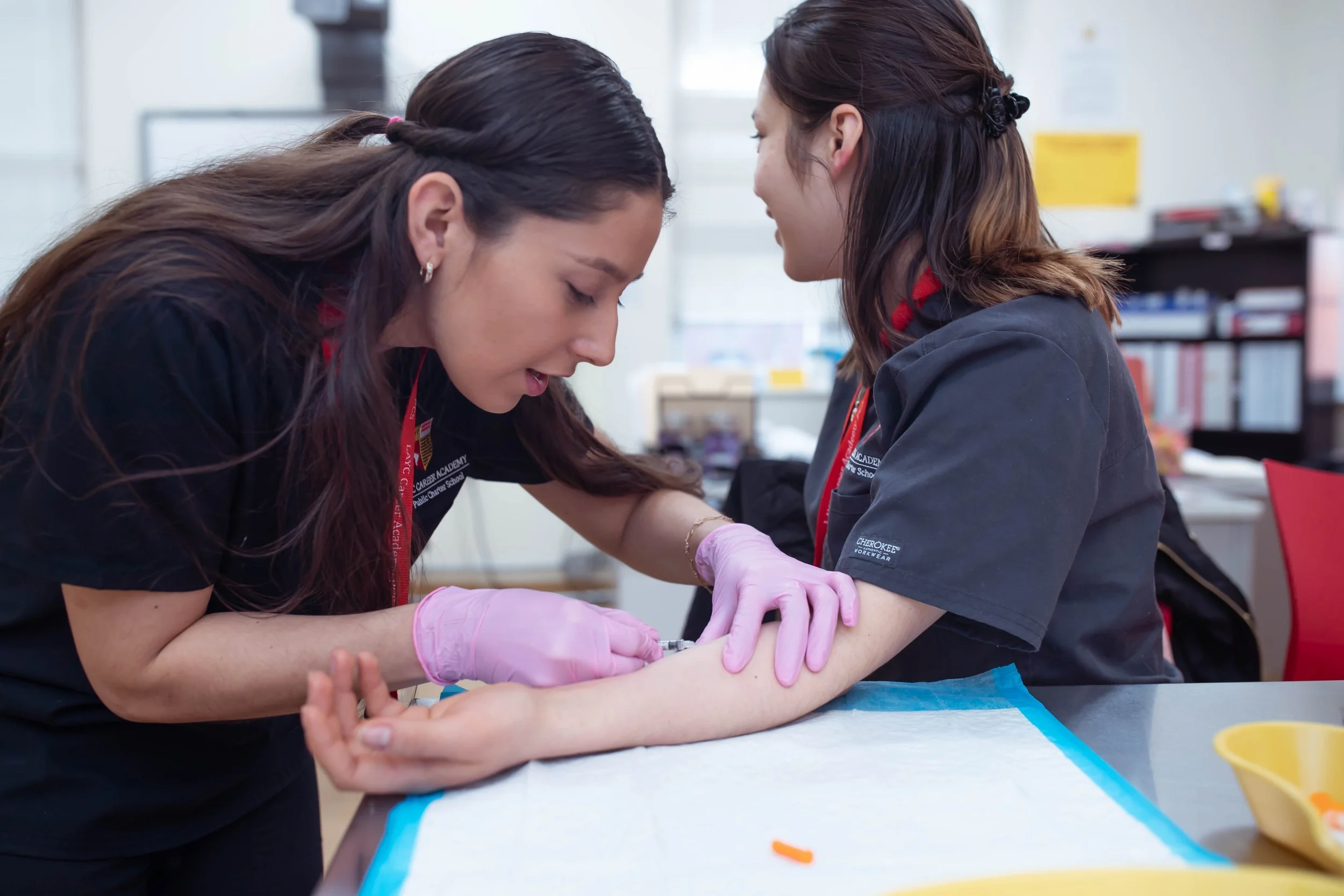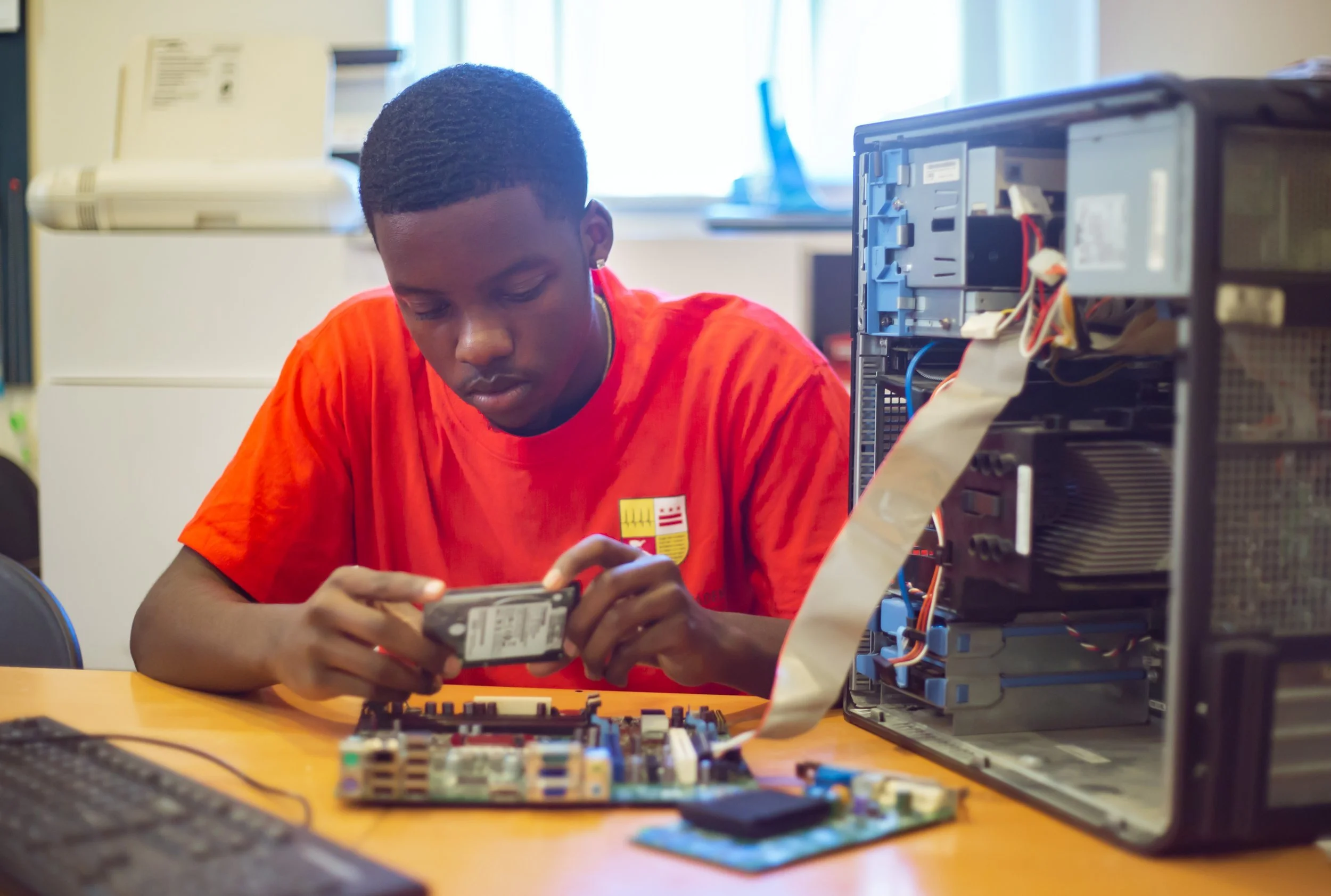The NorthStar Institute – Opening the Window of Opportunity for DC’s ALICE Population
For teachers at Academy of Hope and the LAYC Career Academy (Career Academy) – two of the best-known adult charter schools in DC – helping their students succeed in life is about more than just helping them learn; it’s about helping them thrive.
“Ultimately what we want to see is that our students can progress in life,” Lecester Johnson, CEO of Academy of Hope shared. “From getting the degree, to getting the job, to getting stability for their families and – ultimately – getting them into the middle class.”
Unlike some schools, most students enrolled at Academy of Hope and the Career Academy are over the age of 18 – entering the classroom with a wealth of experience and knowledge from their communities. Both schools provide career training and certifications to help students secure jobs in healthcare, IT, and other fields of work.
However, Nicole Hanrahan, co-Founder and Executive Director of the Career Academy says that even with a degree, most of her students are still living on the edge and doing whatever they can to get by.
“It takes more than an entry-level job and an education to get ahead in this city,” Hanrahan explained. “Our communities need access to financial resources and financial advice and guidance to do things like pay off debt, buy a house, or save for retirement, someday.”
Without the resources and knowledge to accrue additional wealth, Hanrahan and Johnson shared that many of their students have been stuck on the proverbial edge – doing just well enough to get by, but not quite well enough to truly get ahead.
The ALICE Barrier
Reports say that the Career Academy and Academy of Hope students aren’t the only ones stuck in this situation. An annual report by the United Way of the National Capital Area (UWNCA) found that nearly 20% of DC’s Residents are considered part of the ALICE population – an acronym for “Asset Limited, Income Constrained, and Employed.”
Those within the ALICE population live above the Federal Poverty Line, but below the basic cost of living for their neighborhoods. This often means that they are ineligible for federal assistance programs and are forced to live paycheck to paycheck to make ends meet.
The ALICE population includes 20% of DC’s registered nurses and nearly 40% of the city’s office clerks – and a large percentage of the Career Academy and Academy of Hope’s graduating class. Many of these students may also be struggling with credit card debt and low credit scores – which can impact their ability to access credit with favorable conditions and achieve financial milestones like buying a house.
The ALICE population also includes a sizeable portion of the region’s immigrant population – including many who came to this country from successful careers in medicine, law, and business – but have been unable to obtain the proper certifications or education to continue work in their field.
“The sad thing is that, right now, a lot of our students are stuck in survival mode,” Johnson explained. “They’re not necessarily looking for a career or a dream job – they’re looking for stability – something that will keep a roof over their heads and food on their tables.”
“What we want to do is empower them to dream bigger – to not only provide for their families but also to provide for their future.”
The Power of Financial Well-being
For Jua Williams, a financial services expert with more than 20 years of experience in Corporate Financial Services, the scenario is one he’s seen time and time again. As the co-Founder of NorthStar Institute, Jua works to empower DC residents through expert advice and guidance to build wealth by attaining assets.
“There is power in being able to say ‘I know the system of money and understand how it works’,” Williams shared. “With the right resources and proper planning, you can take a good income and turn it into intergenerational stability.”
“The problem is that most ALICE families don’t have access to the knowledge or the capital to make that happen.”
An opportunity finally arose when The Community Foundation’s Health Equity Fund put out a call for “innovative and disruptive ideas to increase the economic mobility and community wealth of DC’s most marginalized communities.”
“We quickly recognized that this was an opportunity to build new partnerships that could transform our community,” Williams explained.
Within a few weeks, NorthStar Institute reached out to the Career Academy and Academy of Hope to brainstorm how they could increase access to financial resources for the students they serve. Over the next few months, the three organizations laid the framework for a new financial well-being partnership aimed at closing the racial wealth gap by helping members of the ALICE population turn income into assets.
The multimillion-dollar project follows a multi-faceted approach, which includes:
Access to Professional Advisers – Through the partnership will operate onsite at the Career Academy and Academy of Hope to provide financial education programs and access to wealth advisers directly within the academies. This will allow students to ask questions of certified professionals, while learning essential tips for financial planning.
Access to Legacy Planning Resources – Whether due to its complexity or a lack of resources, Legacy Planning is often overlooked by ALICE residents – especially those of color. The partnership will allow students access to qualified professionals who will help them navigate the process and retain an asset and build generational wealth.
Education Credit and Training Recovery Services – The partnership will provide access to domestic and international studies to help students obtain credits at an institution of higher learning. This will allow students with international degrees to obtain credits towards a new degree or certification.
Direct Financial Investment – The partnership will provide direct financial investment to help students achieve their goals. The amount and type of investment will vary depending on the goal of the individual and can include credit card payments, a down payment on a home, or other form of investment. In addition, all students will receive a stipend to provide them with some financial stability while they finish their studies.
One unique aspect of this project, Hanrahan says, is that it will not only serve past and current students at both the Career Academy and Academy of Hope, but also staff members – many of whom are also living in the ALICE population.
“Financial wealth building is something that should be accessible to everyone,” she added. “That includes many members of our staff, as well.”
She pointed out how some of her staff are immigrants with professional certifications in different countries but due to systemic barriers, they are unable to practice in the US.
“This program will provide us an opportunity to right that wrong and help them progress in their respective careers.”
Building a Legacy
“Having this kind of service come from us – two trusted organizations working in this community – will go such a long way towards helping our students, who may not have had the opportunity to learn these valuable lessons at home,” Lecester Johnson added, speaking from personal experience.
Born into a family of Southern farmers, Johnson shared how, growing up, her father harbored a deep distrust of financial and banking institutions – a protective reaction to decades of racial discrimination and discriminatory banking practices that were common during the Jim Crow era. As a result, Johnson was forced to learn the ropes of financial investing on her own – relying on trusted friends and mentors to help her plan financially for her future.
“Trust is one of the biggest barriers to helping people take that next financial step,” Williams shared. “You have to really connect with the individual – hear their goals, their dreams, their aspirations – and then take these financial principles and explain them in a way that is relatable and culturally competent but also see where it all fits in the bigger picture.”
Part of that bigger picture includes legacy planning – a major area for improvement amongst the ALICE population – especially communities of color. According to a recent survey, less than 30% of Black Americans in the US have a current will. Countless others may be named as beneficiaries and inherit but feel overwhelmed by the legal complexities and tax requirements to take full advantage.
“When you inherit, it can sometimes be seen as more of a burden than a blessing,” Williams added. “This partnership will provide students with access to professional legacy planners who can help them navigate the experience and set themselves up for success.”
However, partners say the factor they expect will have the biggest impact is the direct financial investment.
“Money really does matter,” Johnson shared. “We’re excited to offer investment at a level where it will make a meaningful difference in people’s lives. Over the next three years, we look forward to tracking the outcomes and seeing how far people are able to progress.”
“I believe this partnership will have a significant impact on DC residents and shifting the ALICE population into the middle class – not just in DC,” Williams added. “One day, we’ll hopefully be able to see this initiative become a blueprint that can be modeled in cities across the country.”
The Community Foundation is proud to support The NorthStar Institute and its work through the Health Equity Fund.
The Health Equity Fund was created to improve the health outcomes and health equity of DC residents. The fund is governed by a seven-member Health Equity Committee in partnership with the Greater Washington Community Foundation. The seven-member committee includes Nnemdi Elias, MD, MPH; Dr. Tollie Elliott; Wendell L. Johns; Lori Kaplan; Juan M. Jara; Kimberly Harris; and Courtney R. Snowden.
For more information about the Health Equity Fund and available funding opportunities, please visit our website!




